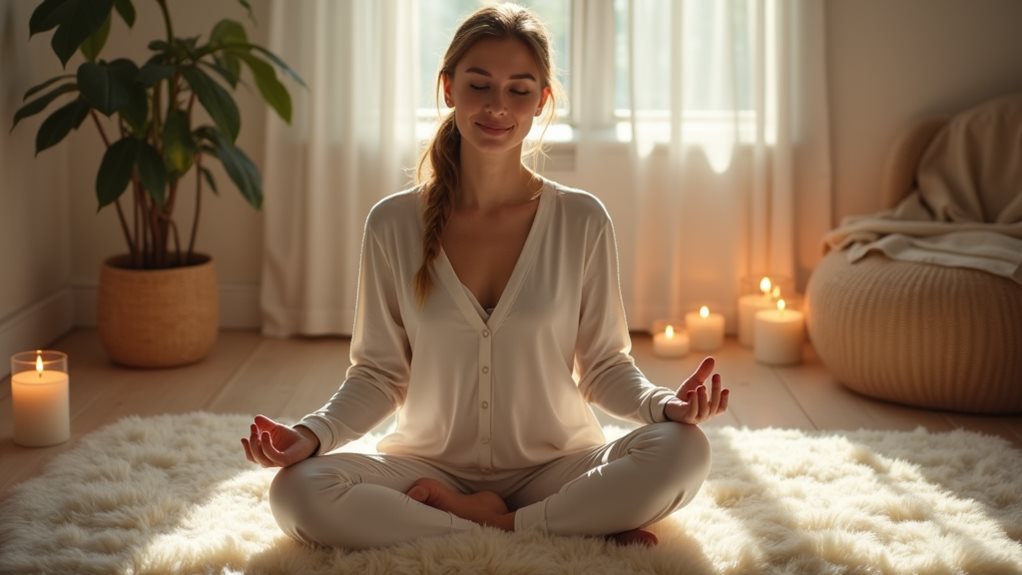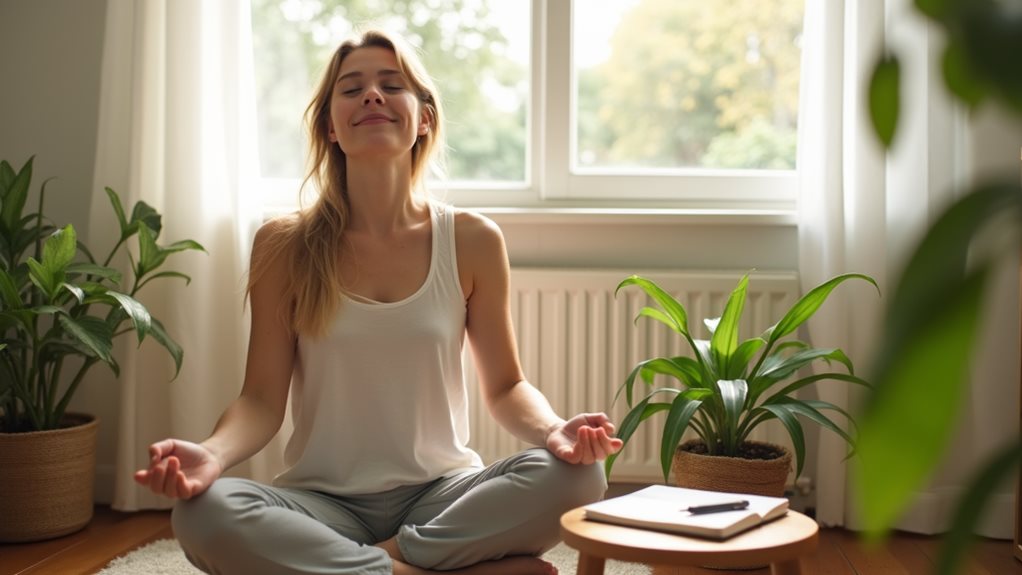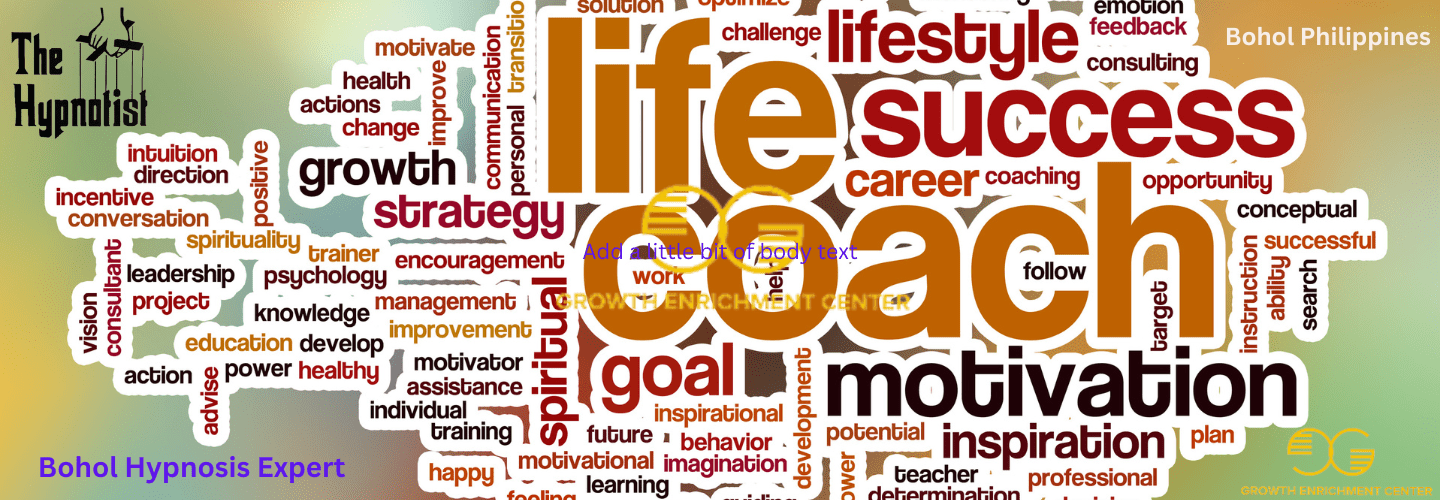
Self-hypnosis can greatly alleviate social anxiety by enabling individuals to master their fears of judgment and negative evaluation. Through focused attention and mental visualization, this technique promotes relaxation and self-assurance in social settings. It allows the reconstitution of cognitive frameworks, making stressful interactions manageable and improving overall quality of life. Further exploration into self-hypnosis could provide additional valuable strategies for sustaining progress in managing social anxiety and enhancing daily personal interactions.
Key Takeaways
- Self-hypnosis utilizes focused attention and relaxation to manage social anxiety by achieving a trance-like state.
- Visualization techniques simulate successful social interactions, building confidence and reducing anxiety.
- Regular self-hypnosis practice helps quickly activate relaxation responses in anxiety-triggering situations.
- Daily practices, including mindfulness and reflective journaling, support ongoing progress in anxiety management.
- Mental rehearsal through self-hypnosis strengthens coping strategies, enhancing confidence in social settings.
Understanding the Impact of Social Anxiety on Daily Life
While social anxiety disorder is often characterized by a fear of judgment and avoidance of social interactions, its impact on daily life is profound and far-reaching.
Social triggers like public speaking or meeting new people can provoke intense anxiety, disrupting normal functioning. This condition's emotional impact extends to feelings of isolation, diminished self-esteem, and strained relationships.
Individuals may experience heightened vigilance in social settings, constantly analyzing their behavior and potential missteps. The continual stress and fear can lead to avoidance of career opportunities, educational pursuits, and social engagements, greatly limiting personal growth and life satisfaction.
Exploring the Basics of Self-Hypnosis
Exploring the basics of self-hypnosis begins with understanding its foundation in the focused attention and deliberate relaxation of the mind.
Self-hypnosis fundamentals revolve around achieving a trance-like state where one can deeply influence their mental processes. This is often facilitated through mental imagery techniques, allowing individuals to visualize scenarios in which they feel confident and at ease.
Techniques for Initiating Self-Hypnosis

Having established a foundational understanding of self-hypnosis, it becomes necessary to address specific techniques for initiating this powerful practice.
Key self-hypnosis techniques involve identifying and addressing personal anxiety triggers. Initially, individuals must cultivate a tranquil environment, minimizing distractions to enhance focus.
Deep breathing exercises aid in achieving a relaxed state, essential for effective self-hypnosis. Mental rehearsal of these techniques strengthens the mind's ability to spontaneously enter hypnosis during stressful situations.
It is important to practice these steps regularly, as familiarity with the process allows for quicker and more profound responses when confronting real-time anxiety triggers in social scenarios.
Visualizing Success in Social Situations
How can one harness the power of visualization to conquer social anxiety?
Visualization techniques offer a powerful tool for confidence building, enabling individuals to mentally simulate successful social interactions. By vividly imagining oneself maneuvering through social scenarios with ease, one can cultivate a mental blueprint that informs real-world behavior.
This method not only reduces anticipatory anxiety but also enhances self-efficacy. Research indicates that regular practice of such techniques strengthens neural pathways associated with positive social engagement.
Empathetically embracing this approach allows individuals to progressively desensitize themselves to anxiety triggers, thereby reconstructing the cognitive framework that governs their social perceptions and reactions.
Incorporating Affirmations for Enhanced Confidence

Many individuals grappling with social anxiety find that incorporating affirmations greatly bolsters their confidence. Affirmation techniques form a critical part of confidence building, enabling a shift from self-doubt to self-assurance. Regular use of specific, positive statements can rewire thought patterns, promoting a more positive self-image and reducing the fear of judgment.
| Affirmation | Impact on Confidence |
|---|---|
| "I am competent and articulate." | Enhances verbal self-assurance. |
| "I am worthy of respect." | Builds self-respect and presence. |
| "I navigate social settings with ease." | Reduces anxiety in interactions. |
This structured approach fosters significant improvements in social interactions.
Stories of Transformation: Real-Life Success With Self-Hypnosis
While self-hypnosis is often viewed skeptically, numerous individuals have experienced profound transformations in managing their social anxiety through this technique.
Personal experiences shared by these individuals highlight the significant role self-hypnosis played in overcoming barriers traditionally associated with social anxiety.
Analyzing these narratives, one finds a common thread of enhanced self-awareness and altered cognitive patterns leading to improved social interactions.
Empathetically, these stories resonate with many who struggle silently, offering them hope and a potential pathway to better mental health.
This evidence-based approach underscores the effectiveness of self-hypnosis, not just theoretically but in real, tangible terms of personal growth and social engagement.
Daily Practices for Sustaining Progress

Consistency is key when integrating self-hypnosis into daily life to sustain progress in managing social anxiety. Incorporating structured self-hypnosis routines, along with mindfulness practices, fosters a conducive environment for continuous improvement.
Effective daily practices include:
- Mindfulness Meditation: Engage in daily sessions to enhance present-moment awareness, reducing anxiety-provoking thoughts.
- Scheduled Self-Hypnosis: Dedicate specific times for self-hypnosis to reinforce coping strategies and positive affirmations.
- Reflective Journaling: Track experiences and feelings daily to identify patterns and progress in managing social situations.
These practices support a structured approach to maintaining gains and enhancing personal growth in social anxiety management.
Integrating Self-Hypnosis With Traditional Therapies for Maximum Benefit
Integrating self-hypnosis with traditional therapies, such as cognitive-behavioral therapy (CBT) and exposure therapy, offers a multifaceted approach to managing social anxiety effectively.
This therapy integration capitalizes on the self-hypnosis benefits of enhanced inner calm and restructured negative thinking, which complement the structured techniques of CBT and gradual exposures used in therapy.
By combining these methods, individuals experience a thorough treatment model that addresses both subconscious and conscious layers of anxiety.
Ultimately, the synergy between self-hypnosis and traditional therapies enables a deeper, more sustainable healing process, empowering individuals to navigate social environments with increased confidence and reduced fear.
Frequently Asked Questions
How Long Does It Typically Take to See Results From Self-Hypnosis?
Results from self-hypnosis techniques, including visualization exercises, can vary. Typically, noticeable changes might be observed within a few weeks to months of consistent practice, depending on individual commitment and the severity of anxiety.
Are There Any Risks Associated With Practicing Self-Hypnosis?
Self-hypnosis carries minimal risks, primarily hinging on individual susceptibility and existing misconceptions. Typically, issues arise from improper technique or misunderstanding its purpose, yet with correct application, it remains a safe, beneficial practice.
Can Self-Hypnosis Replace Medication for Social Anxiety?
Self-hypnosis offers benefits in managing social anxiety by enhancing confidence and emotional resilience. However, it should not replace medication without professional guidance, as its effectiveness varies and lacks the immediate biochemical impact of prescribed drugs.
How Often Should I Practice Self-Hypnosis for Optimal Benefits?
Globally, 7.5% of people suffer from social anxiety. For ideal benefits, practicing self-hypnosis techniques daily is recommended, allowing for progressive mastery and enhanced emotional resilience through regular, focused engagement with these therapeutic practices.
Is Self-Hypnosis Effective for Children With Social Anxiety?
Self-hypnosis techniques may offer benefits for children with social anxiety by fostering relaxation and positive self-perception. However, effectiveness varies, and it should complement professional guidance tailored to children's developmental and emotional needs.
Conclusion
The transformative potential of self-hypnosis in managing social anxiety is underscored by research indicating that 40% of individuals with the disorder notice significant improvement through self-administered techniques. By blending self-hypnosis with traditional therapies, individuals can foster deeper emotional resilience and social confidence. This synergy not only optimizes therapeutic outcomes but also empowers individuals to navigate their social environments with newfound calmness and assurance, marking a critical step towards holistic well-being.





